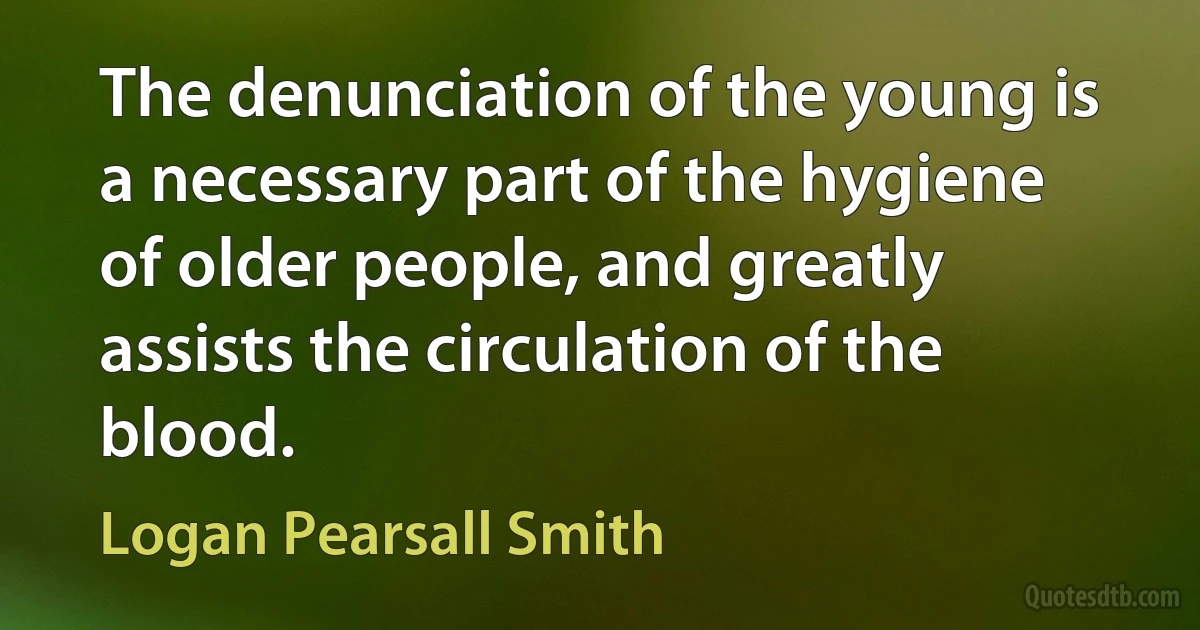Denunciation Quotes
That community is already in the process of dissolution where each man begins to eye his neighbor as a possible enemy, where non-conformity with the accepted creed, political as well as religious, is a mark of disaffection; where denunciation, without specification or backing, takes the place of evidence; where orthodoxy chokes freedom of dissent; where faith in the eventual supremacy of reason has become so timid that we dare not enter our convictions in the open lists, to win or lose.

Learned Hand
...the Assistant Secretary in Charge of Administration (was) a job which should be undertaken only by a saint or a fool...the House and Senate subcommittees in charge of appropriations, their chairmen, and the Comptroller General's office make this job a perfect hell. Like an ill-tempered chatelaine of a medieval manor, her keys hanging from her belt, Congress parsimoniously and suspiciously doles out supplies for the shortest time, each item meticulously weighed and measured, each request at first harshly denied. Almost simultaneously yesterday's accounting goes on amid screamed accusation and denunciation of every purpose of policy."

Dean Acheson
There are also those who, like the author, ensconce themselves on a thunderous crag of omniscience, and with protestations of humility which are either unconvincing or totally absent, assume the obligation of appraisal, commendation, derogation or denunciation of their contemporaries. Still, by and large it is an easier job than digging a ditch.

Jack Vance
In such cases, moreover, it is well to remember that the criminal not merely sins against humanity in inexpiable and unpardonable fashion, but sins particularly against his own race, and does them a wrong far greater than any white man can possibly do them. Therefore, in such cases the colored people throughout the land should in every possible way show their belief that they, more than all others in the community, are horrified at the commission of such a crime and are peculiarly concerned in taking every possible measure to prevent its recurrence and to bring the criminal to immediate justice. The slightest lack of vigor either in denunciation of the crime or in bringing the criminal to justice is itself unpardonable.

Theodore Roosevelt
In the present epoch, when the international class struggle has grown extremely acute, the danger of Right and ‘Left' deviations and of nationalism in the communist movement has grown more tangible than ever before. The struggle against Right- and ‘Left'-wing opportunism and nationalism cannot therefore be conducted as a campaign calculated for only some definite span of time. The denunciation of opportunism of all kinds was and remains an immutable law for all Marxist-Leninist Parties.

Leonid Brezhnev
Propaganda in favor of action that is consonant with enlightened self-interest appeals to reason by means of logical arguments based upon the best available evidence fully and honestly set forth. Propaganda in favor of action dictated by the impulses that are below self-interest offers false, garbled or incomplete evidence, avoids logical argument and seeks to influence its victims by the mere repetition of catchwords, by the furious denunciation of foreign or domestic scapegoats, and by cunningly associating the lower passions with the highest ideals, so that atrocities come to be perpetrated in the name of God and the most cynical kind of Realpolitik is treated as a matter of religious principle and patriotic duty.

Aldous Huxley
Theories of the postmodern - whether celebratory or couched in the language of moral revulsion and denunciation - bear a strong family resemblance to all those more ambitious sociological generalizations which, at much the same time, bring us the news of the arrival and inauguration of a whole new type of society, most famously baptized "postindustrial society"(Daniel Bell) but often also designated consumer society, media society, information society, electronic society, or high tech and the like. Such theories have the obvious ideological mission of demonstrating, to their own relief, that the new social formation in question no longer obeys the laws of classical capitalism, namely, the primacy of industrial production and the omnipresence of class struggle.

Fredric Jameson
In this precise sense, Kant was "the inventor of the philosophical history of philosophy": there are necessary stages in the development of philosophy, that is, one cannot directly get at the truth, one cannot begin wit it, philosophy necessarily began with metaphysical illusions. The path from illusion to its critical denunciation is the very core of philosophy, which means that successful ("true") philosophy is no longer defined by its truthful explanation of the totality of being, but by successfully accounting for the illusions, that is, by explaining not only why illusions are illusions, but also why they are structurally necessary, unavoidable, and not just accidents.

Slavoj Žižek
Your national greatness, swelling vanity your denunciation of tyrants, brass-fronted impudence your shouts of liberty and equality, hollow mockery your prayers and hymns, your sermons and thanksgivings, with all your religious parade and solemnity, are, to Him, mere bombast, fraud, deception, impiety, and hypocrisy -- a thin veil to cover up crimes which would disgrace a nation of savages.

Frederick Douglass
Few great public men have ever been the victims of fiercer denunciation than Abraham Lincoln was during his administration. He was often wounded in the house of his friends. Reproaches came thick and fast upon him from within and from without, and from opposite quarters. He was assailed by Abolitionists; he was assailed by slave-holders; he was assailed by the men who were for peace at any price; he was assailed by those who were for a more vigorous prosecution of the war; he was assailed for not making the war an abolition war; and he was bitterly assailed for making the war an abolition war.

Frederick Douglass
Social reform is not to be secured by noise and shouting; by complaints and denunciation; by the formation of parties, or the making of revolutions; but by the awakening of thought and the progress of ideas. Until there be correct thought, there cannot be right action; and when there is correct thought, right action will follow. Power is always in the hands of the masses of men. What oppresses the masses is their own ignorance, their own short-sighted selfishness.

Henry George
The Diary of Vaslav Nijinjsky reaches a limit of sincerity beyond any of the documents that we have referred to on this study. There are other modern works that express the same sense that civilized life is a form of living death; notably the poetry of T. S. Eliot and the novels of Franz Kafka; but there is an element of prophetic denunciation in both, the attitude of healthy men rebuking their sick neighbors. We possess no other record of the Outsider's problems that was written by a man about to be defeated and permanently smashed by those problems.

Colin Wilson
There is a grandeur in the uniformity of the mass. When a fashion, a dance, a song, a slogan or a joke sweeps like wildfire from one end of the continent to the other, and a hundred million people roar with laughter, sway their bodies in unison, hum one song or break forth in anger and denunciation, there is the overpowering feeling that in this country we have come nearer the brotherhood of man than ever before.

Eric Hoffer
When India and Pakistan conducted their nuclear tests in 1998, even those of us who condemned them, balked at the hypocrisy of Western nuclear powers. Implicit in their denunciation of the tests was the notion that Blacks cannot be trusted with the Bomb. Now we are presented with the spectacle of our governments competing to confirm that belief.

Arundhati Roy
In private life there are few beings more obnoxious than the man who is always loudly boasting; and if the boaster is not prepared to back up his words his position becomes absolutely contemptible. So it is with the nation. It is both foolish and undignified to indulge in undue self-glorification, and, above all, in loose-tongued denunciation of other peoples. Whenever on any point we come in contact with a foreign power, I hope that we shall always strive to speak courteously and respectfully of that foreign power.

Theodore Roosevelt
Right here let me make as vigorous a plea as I know how in favor of saying nothing that we do not mean, and of acting without hesitation up to whatever we say. A good many of you are probably acquainted with the old proverb, "Speak softly and carry a big stick - you will go far.” If a man continually blusters, if he lacks civility, a big stick will not save him from trouble, and neither will speaking softly avail, if back of the softness there does not lie strength, power. In private life there are few beings more obnoxious than the man who is always loudly boasting, and if the boaster is not prepared to back up his words, his position becomes absolutely contemptible. So it is with the nation. It is both foolish and undignified to indulge in undue self-glorification, and, above all, in loose-tongued denunciation of other peoples. Whenever on any point we come in contact with a foreign power, I hope that we shall always strive to speak courteously and respectfully of that foreign power.

Theodore Roosevelt
‘Arrey bhai, but why don't you write on Hindu fatwas?,'-that from a prominent intellectual who carries a haloed name. There is nothing like the fatwa among Hindus-but surely even our intellectuals know that. The point of such admonitions is different. In this view of the matter, a Hindu should stay clear of writing on Islam. Rather, that if he writes about matters Islamic or Muslim, he should only pen Hosannas-'the religion of tolerance, equality...'-he should only write books ‘understanding', that is explaining away the ‘Muslim mind'. At the least, if he just has to allude to some unfortunate drawback in it, he must attribute it to some special time and place and exculpate Islam from it! Even more important, he must make sure that he ‘balances' his remark about that point in Islam with denunciation about something in Hinduism, anything-the caste system, dowry deaths, looking upon foreigners as malechh, at least sati if nothing else fits the bill!

Arun Shourie



